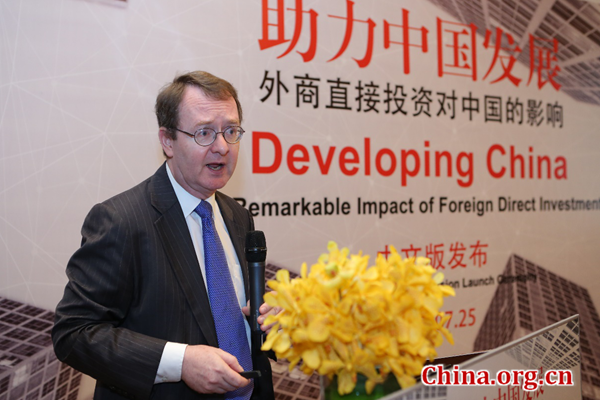Professor: China's FDI highly successful
- By Guo Yiming
 0 Comment(s)
0 Comment(s) Print
Print E-mail China.org.cn, July 26, 2017
E-mail China.org.cn, July 26, 2017
|
Michael J. Enright, known as "one of the world's reigning strategy gurus" by the Academy of International Business, introduces the Chinese version of his book in Beijing on July 25. [Photo provided to China.org.cn] |
China's approach to foreign investment has been extremely successful and the country has been able to benefit from FDI probably more than any other country in the last 35 years, said a senior analyst in Beijing on July 25.
Michael J. Enright, professor at the school of Business at the University of Hong Kong, spoke highly of China's foreign investment at the launch of the Chinese version of his new book, "Developing China: the Remarkable Impact of Foreign Direct Investment."
After almost two years of research on China's inward foreign direct investment (IFDI) and foreign invested enterprises (FIEs) in China's economy, Enright lauded China's step-by-step, sector-by-sector and location-by-location foreign investment strategy, and claimed that "it [China] has not lost sovereignty or influence significantly to the foreign companies."
During China's massive economic transformation, it was thought that a gradual incremental opening up would be better rather than to open up rapidly, and risk a collapse as experienced in other countries, he declared.
In his book, Enright analyzed how the huge FDI inflows, which averaged at US$120 billion per year, had impacted China's economy and brought additional effects including modernizing industries and companies, developing suppliers and distributors, boosting R&D and tech development, as well as improving business practices and standards.
Chinese leaders on multiple occasions expressed a strong willingness for opening up further. In March this year, President Xi Jinping said that "China's opening door will not close", vowing that the country will continue to open up on all fronts.
Premier Li Keqiang, in his government work report this year, also reiterated China's commitment to creating a level playing field for both domestic and foreign companies to ensure that they will be treated equally when it comes to license applications, standard settings, government procurement and will enjoy the same preferential policies under the "Made in China 2025" initiative.
On each stage of China's "revolution" to expand foreign investment, it has been a mutual learning situation in which China has learned about foreign companies and what they could potentially bring to china, and foreign companies have learned that inconducting their business in China, they have to follow all the rules and regulations, said Enright.
While recognizing all the advantages of FDI inflows, Xu Qiyuan, deputy head of the global macro economy division at the Chinese Academy of Social Sciences (CASS), pointed out the undesirable effects brought by foreign investment and foreign-invested enterprises, like technology hold-ups and fierce competition which stifles the growth of domestic companies.
Accordingly, he called for a more sober-minded perspective on opening up and foreign investment along with China's continuous commitment to globalization, particularly through the Belt and Road Initiative.







Go to Forum >>0 Comment(s)